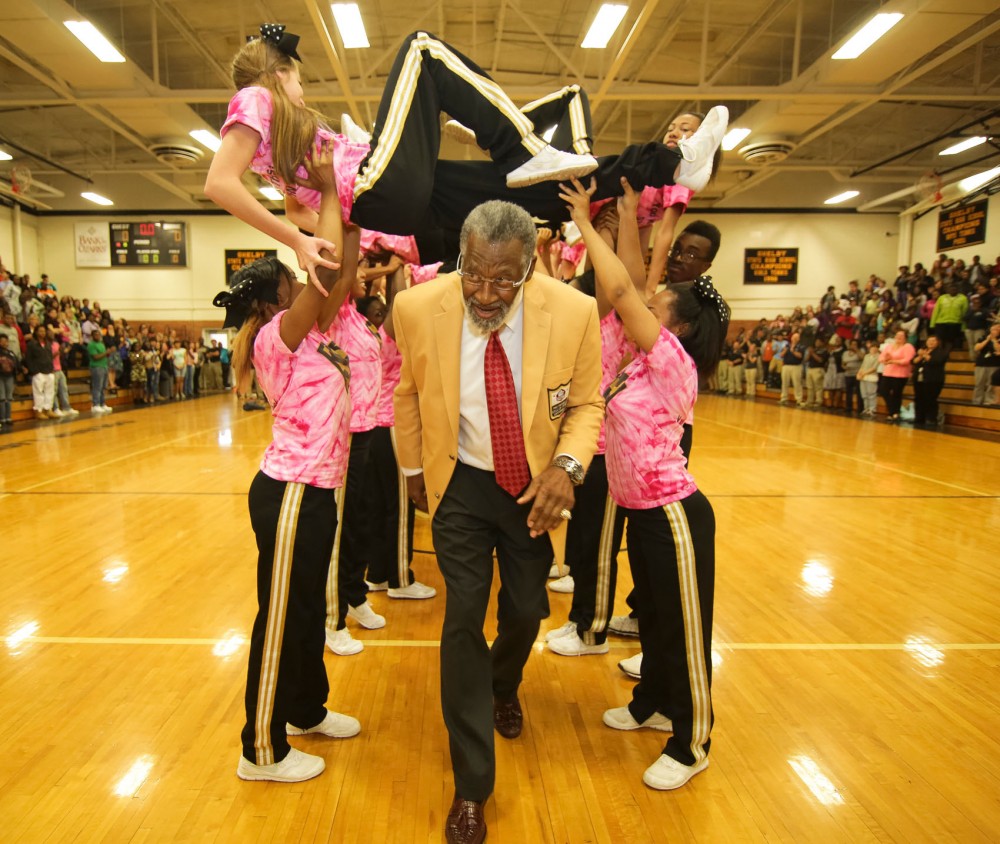Shelby High School Principal and Shelby, N.C., native David Allen recalls hearing the “Legend of Bobby Bell.”
The story goes that the North Carolina football coach was recruiting in Shelby and saw Bell play, Allen said. The coach called Minnesota and said if Bell didn’t end up being a player, he’d pay for his scholarship.
Allen doesn’t know how much truth there is to the story. But if it’s true, the North Carolina coach had nothing to worry about.
Bell wasn’t just a player at Minnesota. He was an All-American.
In the NFL, he was an All-Pro player for the Kansas City Chiefs. Thirty years ago, he was inducted into the Pro Football Hall of Fame.
The 73-year-old Bell returned to Shelby earlier this month and was honored by his community as part of the Hometown Hall of Famers program.
“I was playing for [myself]. I was playing for my mom and dad, my brothers and sisters. I was playing for people in Shelby,” Bell said of his time with Minnesota. “That’s the way I looked at it.”
Until 1965, segregation barred Bell from playing at Southern schools, including the University of North Carolina. At Minnesota, he helped form a pipeline of Southern talent that helped change the landscape of college football.
He played in a pair of Rose Bowl games with the Gophers and was instrumental in the recruitment of several standout players from North Carolina, including Pro Football Hall of Famers Charlie Sanders and Carl Eller and Gophers basketball legend Lou Hudson.
In the mid-1960s, colleges in the South integrated in an effort to remain competitive for athletic talent.
“All of a sudden, the Southern schools said they have to start recruiting these black athletes,” Sanders said. “The opportunity [in the North] started to deplete because the opportunity down South was there. It wasn’t there before.”
A lasting legacy
Bobby Bell grew up in Shelby and attended the now-defunct all-black Cleveland High School.
He played six-man football there, and when local college coaches saw him play in an All-Star game, they tipped Minnesota coaches about his prowess.
“[Coach] sent me a plane ticket. It was the first time I had ever been on a plane,” Bell said. “At that time [there were] 33,000 students at the University. I had never seen anything like it. … It was culture shock for me.”
Bell accepted a scholarship to play for the Gophers, but his decision didn’t come without controversy — fans were skeptical, and coach Murray Warmath was scrutinized for recruiting him.
“They got on coach. They threw trash in his yard and said, ‘Why’d you waste a scholarship on Bobby Bell?’” Bell said. “He didn’t back down at all. He kept me there, and I played.”
Bell was a two-time All-American at Minnesota, and over time, other North Carolina natives took notice and joined him in Minneapolis.
“We started getting a lot of blacks up there. It opened the door,” Bell said. “There was all kind of talent in North Carolina.”
Sanders and defensive tackle McKinley Boston were part of a 15-man recruiting class that helped the Gophers capture the 1967 Big Ten title — their most recent to date.
“Bobby Bell was the pioneer,” Sanders said. “It was probably about 15 black athletes [in my class], the most ever.”
Boston, who also played in the NFL and is now athletics director at New Mexico State, said playing alongside other North Carolina natives made his transition to Minnesota easier.
“It was real, and obviously it was part of the backbone of the 1967 Big Ten championship,” he said of the North Carolina presence on the roster.
Boston said Southern football culture was all about winning, and people in the South were willing to look past racial tensions if it meant winning games.
“They didn’t see it in any other way,” he said.
Bell’s journey came full circle on Nov. 1, when he returned to Shelby for the Hall of Fame ceremony.
Principal Allen said the Pro Football Hall of Fame contacted him in July about hosting the event at the school. Shelby High School students and staff and community members honored Bell with a pep rally.
The Hall of Fame presented the school with a 45-pound bronze plaque to commemorate Bell’s legacy — something most students weren’t aware of.
“Not only did our kids not know who he was, but we had faculty members that were young enough that really had no clue who he was either,” Allen said.
When Allen found out about the ceremony, he asked a social studies teacher to implement a lesson plan about Bell. Teachers spent a class period educating students about Bell’s role in the town and showing footage of his career.
“It’s a big deal down here,” Allen said.
Now, students know the “Legend of Bobby Bell” — and they can make sure it lives on.


